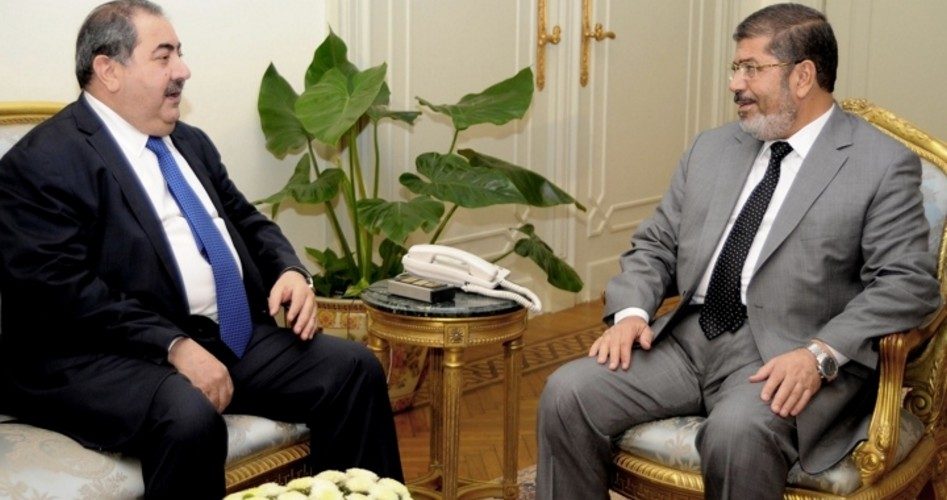
In the fiercely contested presidential race in Egypt, Islamist candidate Mohamed Morsi won by a narrow margin, and in his acceptance speech, the new president sounded a note of reconciliation. But with his inauguration into office, Morsi made it clear that he remains true to the agenda of the Muslim Brotherhood, and he has vowed to work to free Sheik Omar Abdel Rahman, a prominent Jihadist terrorist who has been jailed for his crimes.
As reported for The New American on June 25, Morsi’s victory over former-prime minister Ahmed Shafik was only by a narrow margin—51.7 percent—and was followed by the victor making seemingly-magnanimous statements toward those who opposed his election; in Morsi’s words: “I tell everybody in this memorable day, that because of your choice, your will, and after God’s favor, I am a president for all Egyptians.”
Morsi’s claim to be “president for all Egyptians” was questioned only a few days later, when it became clear that within a day of his election, Shafik was suddenly the subject of a corruption investigation centering on offenses which were alleged to have transpired twenty years ago. As the story was reported Ahram Online:
Less than 24 hours after Ahmed Shafiq lost the presidential contest to Mohamed Morsi, several lawyers have filed complaints with the office of the prosecutor against Mubarak’s last prime minister charging him with corruption.
A high-level judicial source said that councillor Osama El-Seidi, a Justice Ministry investigator, will receive this week the report prepared by experts in the Illicit Profiteering and Real Estate Agency who have examined procedures for the allocation of land sold by the Cooperative for Construction and Housing for Pilots, which was headed by Ahmed Shafiq in the 1990’s.
With such a move occurring immediately following Morsi’s election, the steps which the new president took during his inaugural address to speak to the sentiments of his Islamist base of support raised the possibility of beginning his reign with an international scandal. As reported by the New York Times, Morsi declared his intention to work for the release of convicted Jihadist terror mastermind Omar Abdel-Rahman:
President-elect Mohamed Morsi of the Muslim Brotherhood pre-empted the military’s choreographed swearing-in ceremony by taking an oath of office a day early on Friday, in a televised speech to tens of thousands of supporters in Tahrir Square.
But a promise Mr. Morsi made as part of his speech may provoke Washington: to work for the release of Sheik Omar Abdel Rahman, the Egyptian-born militant Islamist convicted after the 1993 World Trade Center attack of plotting to bomb several New York City landmarks.
Mr. Morsi referred briefly to Mr. Abdel Rahman in an almost offhand aside in the context of a vow to free Egyptian civilians imprisoned here after military trials under the rule of the generals. “I see signs for Omar Abdel Rahman and detainees’ pictures,” he said. “It is my duty and I will make all efforts to have them free, including Omar Abdel Rahman.”
A Brotherhood spokesman said later that Mr. Morsi intended to ask federal officials in the United States to have Mr. Abdel Rahman extradited to Egypt on humanitarian grounds. He was not seeking to have Mr. Abdel Rahman’s convictions overturned or calling him a political prisoner.
In 1996, Rahman was convicted by a jury on 48 out of 50 counts brought against him, including seditious conspiracy, solicitation to murder Egyptian President Hosni Mubarak, conspiracy to murder President Mubarak, solicitation to attack a U.S. military installation, and conspiracy to conduct bombings. The conviction brought the punishment of life in prison.
Morsi’s advocacy of a ‘humanitarian’ release for Abdel-Rahman may be motivated not only by an appeal to the new president’s core of support among Egyptian Islamist, but also as a means for insulting the leadership of Egypt’s military. Abdel-Rahman was accused of leading Al-Gama’a al-Islamiyya, which was allegedly responsible for many attacks in Egypt, including the November 1997 Luxor massacre, which killed dozens of foreign tourists. But Abdel-Rahman’s alleged connections to Jihadist terrorism date back even further:
Sheik Omar Abdel Rahman‘s involvement with terrorism goes back quite ways, to at least the plot to assassinate Egyptian president Anwar Sadat. Rahman was the spiritual leader of a group of young people who had just formed a new cell of the radical group call Jama’at al-Jihad, and they asked him what the fate should be of a ruler who has ignored the law of God. Abdel Rahman’s reply was: “Death.”
The next year, members of this group assassinated Sadat and Rahman was indicted along with them because he was accused of issuing a fatwa ordering Sadat’s murder. Eventually he was acquitted, but even today he makes it quite clear that he does not consider Sadat to have been a Muslim: “Sadat was not a Muslim. He made a mockery of Islam and its principles.”
According to the New York Times account of Morsi’s speech, the Obama administration is privately dismissive of the Egyptian president’s plea on behalf of Abdel-Rahman: “An Obama administration official, speaking on the condition of anonymity, shrugged it all off as empty talk, saying, ‘There is zero chance this happens.’” For the present, the controversy is perhaps less about how the United States might respond to such a demand, as it is about the fact the newly-elected president would engage in such a controversial act of defiance on the day of his inauguration; after all, the Obama adminstration has been widely understood to have strongly supported the ‘democratic’ reforms which swept Morsi and his Muslim Brotherhood allies into power. Having Morsi give the appearance of linking his presidency with the advocacy on behalf of an alleged terrorist seems a strange reward for his American friends, and a curious posture for a president to adopt when his military relies on billions of dollars in U.S. aid.
Photo: Iraqi Foreign Affairs Minister Hoshyar Zebari, left, meets with newly-elected President Mohammed Morsi in Cairo, Egypt, July 2, 2012: AP Images



